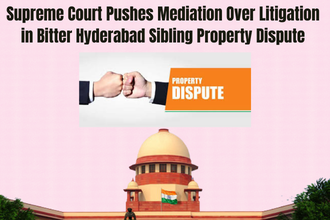The Supreme Court of India, in a significant judgment delivered on April 26, 2025, has clarified the procedural aspects of challenging compromise decrees under the Civil Procedure Code (CPC), specifically addressing the scope and limitations of Order XLIII Rule 1A of the CPC.
In the case of Sakina Sultanali Sunesara (Momin) vs Shia Imami Ismaili Momin Jamat Samaj & Ors., the Supreme Court has ruled that a party to a compromise decree cannot directly appeal against the compromise before the Appellate Court. Instead, the concerned party must first approach the Trial Court under the proviso to Order XXIII Rule 3 of the CPC to seek a determination on whether the compromise is lawful or not.
Key Observations of the Court
The judgment addressed a situation where the appellant had challenged the recorded compromise decree before the High Court by invoking Order XLIII Rule 1A of the CPC. The appellant claimed a lack of knowledge about the compromise and argued that the recorded compromise decree was invalid. However, the Court clarified that such an appeal could not be directly filed before the Appellate Court. Instead, the concerned party must first approach the Trial Court to raise any objections regarding the compromise.
The Court explained that Order XLIII Rule 1A does not provide an independent right of appeal. It allows an appellant, who has already filed an appeal against a decree, to challenge a non-appealable order that contributes to the judgment resulting in the decree. However, this rule does not permit a direct challenge to the compromise decree itself.
Process for Challenging Compromise Decrees
The Court’s ruling stressed that the correct procedure for a party challenging a compromise decree is to invoke the proviso to Order XXIII Rule 3 of the CPC, which mandates that the Trial Court must decide whether the compromise is valid or not. This is because once a compromise decree is drawn, a party’s right to challenge it is restricted under Section 96(3) of the CPC, which bars an appeal from a decree passed with the consent of the parties.
Thus, if a party disputes the validity of a compromise, they must first approach the Trial Court to challenge the compromise. If the Trial Court rejects the objection and passes a decree against the objecting party, only then can an appeal be filed under Section 96(1) of the CPC. In this appeal, the appellant may, by virtue of Order XLIII Rule 1A(2), challenge the recording of the compromise.
High Court’s Role in Reviewing the Appeal
The Supreme Court affirmed the decision of the Gujarat High Court, which had ruled that the appellant’s appeal should have been dismissed for non-compliance with the prescribed procedure. The High Court had correctly applied the statutory framework and dismissed the appellant’s appeal, noting that the appellant had bypassed the Trial Court and directly approached the Appellate Court.
The judgment further clarified that a party bound by a compromise decree cannot appeal against the decree under Section 96(3) of the CPC unless they have first raised the objection before the Trial Court. However, if the compromise decree affects the rights of a person who was not a party to the suit, they may approach the Appellate Court under Section 96, provided they first obtain leave from the Court.
Conclusion and Legal Implications
This judgment provides much-needed clarity on the procedure for challenging compromise decrees under the CPC. It reinforces the importance of following the proper legal route when disputing a compromise and emphasizes that the Appellate Court cannot be directly approached without first exhausting the available remedies at the Trial Court level.
For legal practitioners and parties involved in litigation, this ruling underlines the significance of adhering to procedural rules and clarifies the role of various provisions of the CPC in appeals and compromises. The judgment ensures that the appeal process is not misused to bypass established legal procedures, thereby safeguarding the integrity of judicial processes in India.
Case Title: Sakina Sultanali Sunesara (Momin) vs Shia Imami Ismaili Momin Jamat Samaj & Ors.
Citation: 2025 LiveLaw (SC) 489
This decision adds to the evolving jurisprudence surrounding the interpretation of the Civil Procedure Code and offers crucial insights for parties involved in suits and appeals related to compromise decrees.


